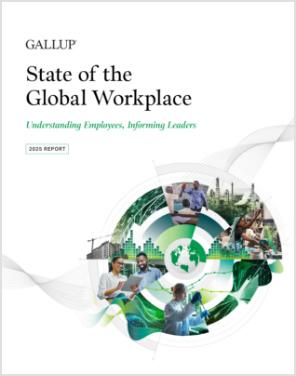Story Highlights
- Gallup's annual workplace study shows a record high number of employees looking for a new job
- Labor market volatility in Germany is approaching levels seen in the U.S.
- Engaged workers are the least likely to quit -- the disengaged are recruiters' sweet spot
Job recruiters in Germany must be exhausted. They contacted a record-high 31% of employees in 2021, up from 15% in 2019. The field is broader than ever -- 14% of German workers are actively looking for a new job, Gallup finds -- and it's taking recruiters an average of 122 days to fill a vacancy with a qualified employee, according to the Bundesagentur für Arbeit (Germany's federal job agency). It took 97 days five years ago. Ten years ago, recruiters filled jobs in 65 days.
It's enough churn to make people suspect Germany has entered "Great Resignation" territory. It's possible. Gallup's annual German workplace study shows that four in 10 (39%) say they would stop working entirely if they could afford it, which is up from the 25% found in 2016 - shocking, considering Germany's work-ethic culture. Meanwhile, 40% of workers are looking around for a different job. Gallup hasn't ever recorded such high numbers of job-seekers in Germany and they are approaching the volatility of the U.S. labor market, the original home of the "Great Resignation."
Meanwhile, leaders in Germany say their biggest challenge is finding and retaining workers when recruiters have so many ways to communicate with potential employees. As Gallup's Director of Hiring Analytics Kristin Barry noted earlier this year, recruiters are making compelling offers across the org chart -- and their message is getting through.
"Many leaders have found themselves surprised by some of the recent departures from their organizations. These departing employees were not the 'likely suspects.' They were well-connected, well-supported and thriving at the organization. Now they are gone."
That can have dire consequences for leaders. But take heart: a staggering 95% of engaged employees in Germany say they intend to work where they do now in a year.
But take heart: a staggering 95% of engaged employees in Germany say they intend to work where they do now in a year.
The Ones to Woo
That's very good news. Engaged workers are by far the most valuable ones. Gallup's most recent meta-analysis compared employee engagement levels and found differences in business outcomes when comparing top- and bottom-quartile teams. The positive business outcomes include a 23% difference in profit and an 18% difference in productivity related to sales. Alternately, negative business outcomes include a 41% difference in quality (defects) and a 64% difference in safety incidents (accidents), among other KPIs.
Engaged workers in Germany are also the least likely to say stress at work has made them feel burned out in the last 30 days (19% vs. 49% of the actively disengaged German workers who say the same).
The actively disengaged, conversely, cost the German economy between 92.9 and 115.1 billion euros in lost productivity in 2021, Gallup estimates. Perhaps it's cheering to know that 73% of them expect to be working elsewhere a year from now (as do 42% of employees who are not engaged).
On the other hand, engaged workers are a minority. The Gallup Engagement Index Deutschland for 2021 shows that 69% of German employees are not engaged and 14% are actively disengaged, leaving just 17% among the engaged.
These engaged workers are who recruiters are trying so hard to woo. Though, if recruiters are successful, the new workers may follow in the footsteps of those who quit before them. Not because they can't be engaged, but because they're taking jobs in the same work cultures that disengaged workers just left. And regardless of engagement level, 38% of employees in Germany say they felt burned out due to stress at work in the last 30 days.
With that in mind, recruiters' exhausting schedules may be due to people suddenly looking for -- and expecting to get -- a better employee experience. As is the case in the U.S., Germany isn't so much seeing a "Great Resignation" as it is a "Great Reshuffle."
What You Can Do Now
"Great Resignation" vs. "Great Reshuffle" -- it may seem like a distinction without a difference, but it's not. For one thing, there's no net loss of workers in a "Great Reshuffle," which is important to Germany's GDP and thus crucial to Europe's GDP. To leaders, however, a "Great Reshuffle" signifies an incredible opportunity to attract and engage talent. Including talent that's already on staff.
To seize that opportunity, leaders have to offer the experience workers want.
Admittedly, that's not a small task. Those cultures tend to be values-oriented, agile, and run by leaders and well-developed managers who can centralize their purpose, leverage employee strengths and care about their people as people (not means for production).
A "Great Reshuffle" signifies an incredible opportunity to attract and engage talent. Including talent that's already on staff.
Engineering that kind of culture takes time -- and recruiters are circling. So while leaders assess their capacity for culture transformation, they should take immediate action on improving their employee experience where they can.
Start with wellbeing. When so many workers are experiencing burnout, encourage managers to develop genuine relationships with employees centered around their strengths, aspirations and contributions.
Allow employees to work where they want -- which is, incidentally, a top demand of job-seekers -- to support their work-life balance and decrease stress. Right now, 30% of German workers strongly agree with the statement, "My company cares about my overall wellbeing," and 29% strongly agree with the statement, "My organization offers me good opportunities for training and skill development." It's a good idea to amplify messaging about corporate wellbeing programs as well. Most people don't know much about their company's wellbeing offerings.
At the same time, communicate how your ESG (environmental, social and governance) commitments affect employees and differentiate your company.
A good place to start is with the five survey items Gallup experts identified as highly predictive of future behaviors and business outcomes.
German workers indicate there's room for improvement on each of the five items:
- 34% of German workers strongly agree their company would do the right thing about an ethics and integrity issue
- 52% strongly agree that they're always treated with respect at work
- 28% strongly agree there is someone at work who encourages their development
- 30% strongly agree their company cares about their overall wellbeing
- 32% of German workers strongly agree their organization makes a positive impact on people and the planet
These items are collectively known as the People and Planet 5 survey, which is licensed to the world for free in more than 50 languages. All employees should take it, and all leaders should take it seriously.
Finally, endorse a culture of feedback. Only two in 10 (18%) German workers say they have developmental experiences and receive structured guidance. Just a few more (29%) say that they receive regular and helpful feedback from their manager. Whether the feedback recognizes a job well done, highlights an opportunity to improve, or hones a skill, feedback connects people to their companies and affirms their contributions.
The most effective feedback is asked for, but any feedback that's prompt, well-meant, and future-oriented is better than none.
The Real Business Problem -- and the Solution
Taking those actions will create an environment people want to work in, but they should be tackled in tandem with, not instead of, efforts to create a culture of engagement.
Disengagement is probably a bigger business problem than -- though possibly a primary cause of -- the "Great Reshuffle." Poor engagement drives workers to look elsewhere for a better experience. Leaders need to recognize disengagement as the danger it is.
Still, it's natural that the threat of a German "Great Reshuffle" gets more attention. A shockingly high percentage of workers are looking for a new job and a record-high percentage of workers are hearing from recruiters. Of course that worries leaders.
But viewing churn as a signal to entrench engagement provides leaders with effective solutions and some control in a turbo-charged labor market. And it gives them a huge competitive advantage: 77% of engaged employees in Germany strongly agree that they would recommend their company as a place to work to friends or family members, compared with 3% of actively disengaged employees. People trust their friends' recommendations far more than a recruiter's message, so employees' influence can have a crucial impact.
Employees' influence always has an impact, though. Their engagement relates to organizational performance, productivity, and profitability, and it has a strong connection to wellbeing, too. German companies need those attributes, whether or not they're facing a "Great Resignation" or "Great Reshuffle." But if they are, recruiters are going to find engaged employees are a tough audience -- and disengaged ones an easier sell.
Engage your employees so they're tough to recruit:
- Learn the fundamentals of employee engagement.
- Measure engagement in your organization with Gallup's Q12 survey or partner with us.
- Download our study results to discover the science behind employee engagement.




